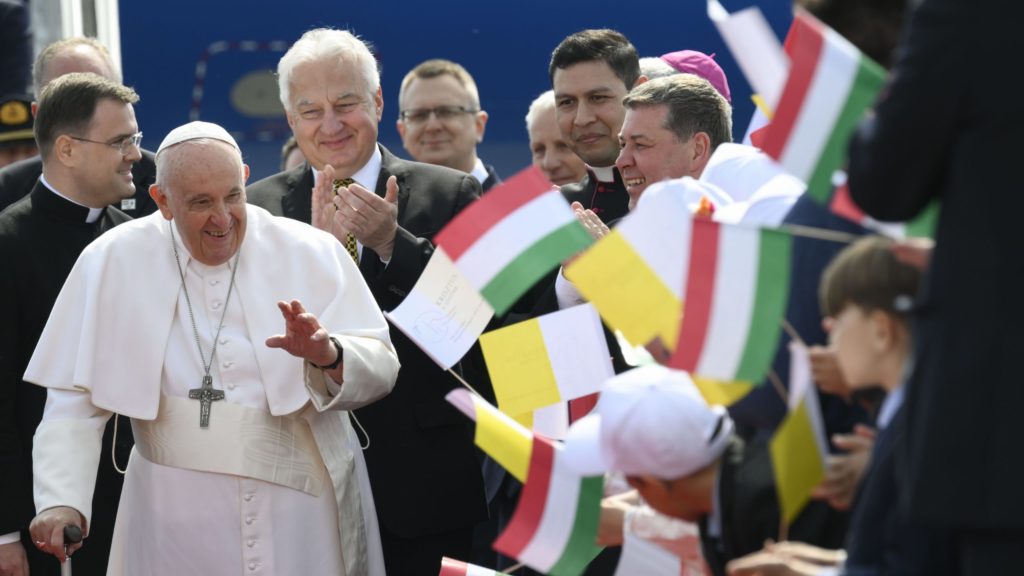Paying homage to Hungary's history, culture and location in the heart of Europe, Pope Francis pushed against the notion that the country needed to insulate itself to protect its identity.
As expected, in his first speech in Hungary -- to government and civic leaders and diplomats serving in Budapest -- the pope acknowledged efforts to protect traditional values, but insisted those values include supporting European unity, welcoming migrants and working to end the war in neighboring Ukraine.
The "passionate quest of a politics of community and the strengthening of multilateral relations seems a wistful memory from a distant past," he said April 28 in his speech at the former Carmelite monastery that now houses the office of Prime Minister Viktor Orbán.
"More and more," the pope said, "enthusiasm for building a peaceful and stable community of nations seems to be cooling, as zones of influence are marked out, differences accentuated, nationalism is on the rise and ever harsher judgments and language are used in confronting others."
The 86-year-old pope, who was released from the hospital April 1 after what the Vatican said was a bout of bronchitis and who frequently has been using a wheelchair or walker because of knee problems, simply used a cane when he walked the length of the ITA Airways plane to greet journalists during the two-hour flight from Rome.
He joked about his health -- "weeds never die" -- and, in response to a Polish journalist who thanked him for defending St. John Paul II, the pope described as "foolishness" rumors that the Polish pope was somehow involved in the disappearance in 1983 of Emanuela Orlandi, a 15-year-old Vatican resident.
Pope Francis continued using the cane instead of a wheelchair as he walked down the red carpet at the Budapest airport and around the presidential Sándor Palace where he met privately for 25 minutes with Hungarian President Katalin Novák and then for 20 minutes with Orbán.
Novák, welcoming Pope Francis to the meeting with government and civic representatives, told him Hungarians expected to receive encouragement from him in their quest to help make Europe "more peaceful, more democratic and stronger."
"Over the past 30 years," she told him, Hungarian Catholics, Orthodox and Protestants have joined forces in "the ecumenism of the preservation of Christian values," specifically regarding marriage, family life and abortion.
In his speech, Pope Francis told those gathered that around the globe politics is showing signs of an "adolescent belligerence" that seems more about stirring up emotions than resolving problems.
"Peace will never come as the result of the pursuit of individual strategic interests, but only from policies capable of looking to the bigger picture, to the development of everyone: policies that are attentive to individuals, to the poor and to the future, and not merely to power, profit and present prospects," Pope Francis said.
That attention, he said, must allow room for the different countries of the European Union and the different communities within each nation to assert their own identities but not at the cost of denigrating or denying the rights of others.
Mentioning some areas of common ground with Orbán's government, Pope Francis described as "ideological colonization" efforts to promote acceptance across Europe of "so-called gender theory," which sees gender as a social construct rather than a biological fact, and "reductive concepts of freedom, for example by vaunting as progress a senseless 'right to abortion,' which is always a tragic defeat."
"How much better it would be to build a Europe centered on the human person and on its peoples," he said, pointing positively to Hungary's pro-family policies that encourage married couples to have children.
But Pope Francis also used the words of St. Stephen, the 11th-century king of Hungary, to draw attention to the theme of migration, a major area of difference with Orbán who, since 2015, has promoted a "no migrants" policy.
The sainted king, the pope said, told his people: "I urge you to show favor not only to relations and kin, or to the powerful and wealthy, or to your neighbors and fellow countrymen, but also to foreigners and all who come to you."
Migration, Pope Francis said, is a "heated" topic in today's world, but "for those who are Christians, our basic attitude cannot differ from that which St. Stephen recommended," a lesson learned from Jesus, "who identified himself with the stranger needing to be welcomed" in Matthew 25.
Pope Francis said it was "urgent" that Europe as a whole devise "safe and legal ways" for those fleeing violence, poverty and climate change to enter its borders.
Migration cannot be stemmed by a general attitude of rejecting the possibility, he said, "but must be embraced in order to prepare for a future that, unless it is shared, will not exist."

